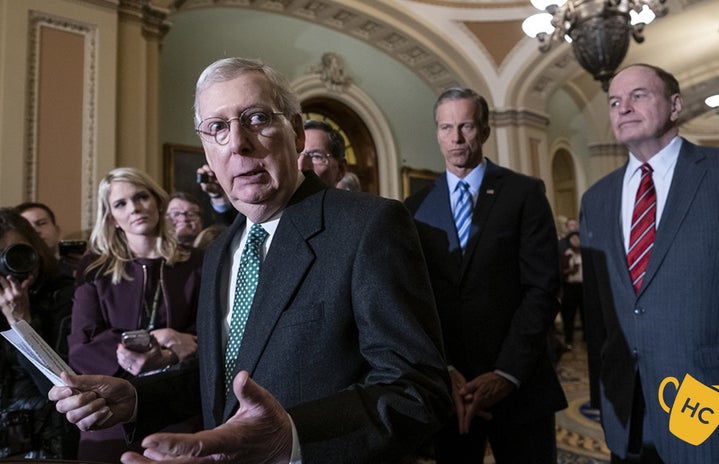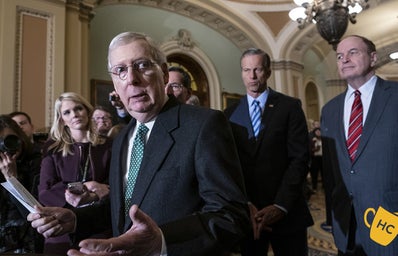Good morning, Her Campus! With a break-neck news cycle, there is no possible way for you to stay on top of every story that comes across your feeds—we’re all only human, after all.
But, life comes at you fast. So grab a cup of coffee and settle in for this quick and dirty guide to stories you might’ve been sleeping on (like, literally. It’s early.)
Judge Rules Manafort Lied to Federal Investigators After Plea Deal
A federal judge accepted on Wednesday federal prosecutors’ argument that Paul Manafort, President Donald Trump’s former campaign chairman, continued to lie to special counsel Robert Mueller’s team after signing a plea agreement. The ruling could mean that Manafort could face a harsher prison term when he is sentenced in Washington D.C. next month.
Breaking News: Paul Manafort, the Trump campaign’s ex-chairman, repeatedly lied to prosecutors after agreeing to cooperate in the Russia inquiry, a judge ruled https://t.co/cVcpp2aMTX
— The New York Times (@nytimes) February 14, 2019
“Therefore, the Office of Special Counsel is no longer bound by its obligations under the plea agreement, including its promise to support a reduction of the offense level in the calculation of the U.S. Sentencing Guidelines for acceptance of responsibility,” Judge Amy Berman Jackson wrote in an order issued Wednesday.
Jackson wrote that the special counsel’s office “established by a preponderance of the evidence” to support its claim that Manafort misled federal investigators over the course of 12 interviews after he had struck his plea agreement, ABC News reports.
The special counsel’s office argued Manafort was not truthful about his contacts with Konstantin Kilimnik, a business associate with ties to Russian intelligence, as well as the source of a $125,000 payment he received that appears to be from a well-funded political action committee that supported Trump’s 2016 campaign, USA TODAY reports. In addition, federal prosecutors said he lied about other information relating to another unidentified Justice Department investigation.
However, Jackson ruled that federal prosecutors “failed to establish” evidence that Manafort lied about his contacts with the administration and Kilimnik’s role in the obstruction of justice case against Manafort.
According to ABC News, Manafort’s defense team has said that Manafort has “provided complete and truthful information to the best of his ability.”
Jackson, however, agreed with Manafort’s untruthfulness caused a breach of his plea deal with federal prosecutors, and as a result, he could face a lengthy prison sentence of up to 80 years. Legal experts think it will most likely be closer to seven years.
GOP Wants to Change Rules to Confirm Trump’s Nominees More Quickly
Senate Republicans are moving to speed up the process to confirm nominees more quickly, in an attempt to stop Senate Democrats from delaying President Donald Trump’s appointments.
In a 10-9 party-line vote Wednesday, GOP-led Senate Rules Committee approved procedural changes to shorten the amount of time lower judicial and executive nominees could be debated on the Senate floor.
JUST IN: GOP advances rules change to speed up confirmation of Trump nominees https://t.co/DOf7QlaYdR pic.twitter.com/dxuhtyXtbU
— The Hill (@thehill) February 13, 2019
Under current rules, in what is known as post-cloture time, senators have up to 30 hours to debate a nominee after they have voted to advance the nomination to the final vote, The Huffington Post reports.
Republicans have argued that Democrats are abusing the process to slow the confirmation of several lower court and administrative nominees, thus affecting government agencies that are having to run with a limited staff since the nominees are still waiting on confirmation votes.
“The real crisis here is the administration itself below the Cabinet level has an enormous number of vacancies,” Senate Majority Leader Mitch McConnell (R-KY) said. “Once we get to cloture on a number of these nominees they aren’t even controversial. So it’s pretty obvious the whole purpose is just to eat up floor time.”
This proposal, introduced by committee Chairman Roy Blunt (R-MO) and James Lankford (R-OK), would limit that debate time to only two hours per nominee, speeding up the process significantly.
Senate Rules Committee ranking member Amy Klobuchar (D-MN) criticized the proposal, saying it would eliminate “important checks and balances” and make it easier for the Senate to confirm unqualified candidates, Politico reports.
“If this passes, roughly 80 percent of all Trump administration nominees will be able to be confirmed with just two hours of debate time,” Klobuchar, a 2020 presidential candidate, said. “In Minnesota, that’s about the amount of time it takes to make a hot dish.”
But the proposal will likely fall short of the 60 votes needed to pass it due to Democratic opposition.
According to HuffPost, Republicans suggested Wednesday that they intend to move forward and pass the proposal unilaterally by going “nuclear,” a move that would require only 51 votes for pass it.
“Make no mistake that Republicans can change this and will,” Sen. Lamar Alexander (R-TN), a top ally of McConnell, said during the hearing.
House Democrats Postpone Vote on Leadership Term Limits
House Democrats have postponed a scheduled vote on leadership term limits, and there is currently no date set for any action on the issue.
Rep. Ed Perlmutter (D-CO) announced in a House Democratic Caucus meeting on Wednesday that there will be no vote on leadership term limits by February 15th, Politico reports.
House Democratic leaders have postponed a planned vote on leadership term limits, with no date set yet for any action on the controversial issuehttps://t.co/QcQNyZRcXf
— POLITICO (@politico) February 13, 2019
“Recognizing we were in a partial government shutdown for 35 days and now with regular order starting back up, our caucus will begin the conversation about leadership term limits based on an agreement reached with Speaker Pelosi at the end of last year,” Perlmutter said in a statement.
Perlmutter, along with other Democrats, withheld their support for now-House Speaker Nancy Pelosi (D-CA) to take up the gavel again, unless she agreed to placing a term limit on her return to the speaker’s chair and other leadership positions, Townhall reports.
The term limit plan would limit party leaders to three terms, with a fourth term possible if two-thirds of the Democratic Caucus support it. Pelosi, currently considered to be serving her third term, would need the support of at least two-thirds of the Democratic Caucus in order to continue past her current term.
What to look out for…
Happy Valentine’s Day! Make sure to score some free food to make your heart (and stomach) happy with these Valentine’s deals!


